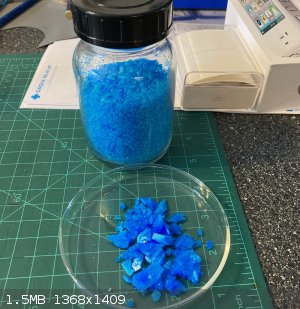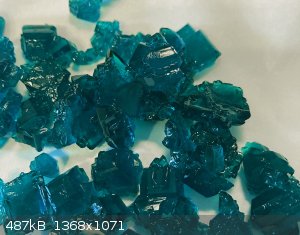Arthur Dent
National Hazard
   
Posts: 553
Registered: 22-10-2010
Member Is Offline
Mood: entropic
|
|
Synthesis of Nickel Sulfate
I have a question about the synthesis of Nickel Sulfate...
Recently I have prepared successfully a good quantity of Copper Sulfate using the good old technique of gently heating telephone wire in sulfuric
acid, and adding dropwise a bit of H2O2...
So I figured that the chemistry of Nickel must be similar, so I prepared a beaker filled with pieces of nickel (pre-1980 canadian dimes) with H2SO4,
heating it gently and adding small quantities of H2O2... but oddly, instead of getting a nice clear greenish solution, I get a very pale green, milky
solution... it bubbles lightly, but it looks like a lot of suspended particles.
The chemistry indicates that one of the techniques to produce Nickel Sulfate is to treat nickel with H2SO4. My sulfuric acid is pretty clean and
clear, and my nickel is 99.9% pure, so I am curious if I should leave this for a while and it will work or am I missing something?
Included is a pix of the copper sulfate I prepared last week. Nice crystals! 

--- Art is making something out of nothing and selling it. - Frank Zappa ---
|
|
|
fx-991ex
Hazard to Others
  
Posts: 102
Registered: 20-5-2023
Member Is Offline
|
|
The anhydrous form is yellow, different hydrate will be blue or green.
I just made some 2 days ago with H2SO4 and 20%H2O2, same thing happened. First was a white/yellow precipitate and it turned green after some
time(probably because of the water from the H2O2). It was very slow, i added KNO3 to speed it up as am after the nickel nitrate(No nitric acid around,
used everything i have and too lazy to make more).
I used pre 2000 canadian quarter, they should be 99.9% nickel.
Here is a quote from the nickel compound wiki:
There is also an anhydrous form, a dihydrate and a tetrahydrate, the last two crystallised from sulfuric acid. The hexahydrate has two forms, a blue
tetragonal form, and a green monoclinic form, with a transition temperature around 53 °C.[19] The heptahydrate crystallises from water below 31.5
above this blue hexhydrate forms, and above 53.3 the green form.
[Edited on 11-6-2023 by fx-991ex]
[Edited on 11-6-2023 by fx-991ex]
[Edited on 11-6-2023 by fx-991ex]
|
|
|
Arthur Dent
National Hazard
   
Posts: 553
Registered: 22-10-2010
Member Is Offline
Mood: entropic
|
|
Thank you FX!
Then i'll just let the mixture simmer slowly at ambient temperature over this week and hope I see a change in color. Using H2O2 as oxidizer usually
speeds up the process but I guess Nickel is a bit more capricious. I'd love to be able to generate Nickel sulfate crystals as nice as the CuSO4
crystals i've made last week.

--- Art is making something out of nothing and selling it. - Frank Zappa ---
|
|
|
fx-991ex
Hazard to Others
  
Posts: 102
Registered: 20-5-2023
Member Is Offline
|
|
I used 2 quarter about 5 gram each with 5 ml H2SO4 and 10-15 drop of H2O2, after 2 or 3 days only 0.21grams was removed from the quarter(around 0.5G
of NiSO4).
Will work if you need only a very small amount and have a lot of time.
Should probably use the electrolysis route. This is what i did last time i made nickel acetate for electro-plating.
[Edited on 11-6-2023 by fx-991ex]
|
|
|
DraconicAcid
International Hazard
    
Posts: 4360
Registered: 1-2-2013
Location: The tiniest college campus ever....
Member Is Offline
Mood: Semi-victorious.
|
|
Once you have nickel suphate, you can also make double salts such as (NH4)2Ni(SO4)2*6H2O. Very pretty.
Please remember: "Filtrate" is not a verb.
Write up your lab reports the way your instructor wants them, not the way your ex-instructor wants them.
|
|
|
Bedlasky
International Hazard
    
Posts: 1245
Registered: 15-4-2019
Location: Period 5, group 6
Member Is Offline
Mood: Volatile
|
|
What concentration of H2SO4 did you used?
|
|
|
Arthur Dent
National Hazard
   
Posts: 553
Registered: 22-10-2010
Member Is Offline
Mood: entropic
|
|
"What concentration of H2SO4 did you used?"
Technical, around 96%, very clear.
After three days, no change, solution is cloudy light green, nickel pieces are dark gray, doesn't seem to be any activity, maybe the metal has been
passivated. I'll try to simmer it at low heat tomorrow, and maybe add a bit of peroxide again.
--- Art is making something out of nothing and selling it. - Frank Zappa ---
|
|
|
teodor
National Hazard
   
Posts: 928
Registered: 28-6-2019
Location: Netherlands
Member Is Offline
|
|
You can dissolve copper in ammonium persulfate water solution. Does persulfate work for nickel also?
[Edited on 13-6-2023 by teodor]
|
|
|
Bedlasky
International Hazard
    
Posts: 1245
Registered: 15-4-2019
Location: Period 5, group 6
Member Is Offline
Mood: Volatile
|
|
Concentrated H2SO4 isn't very good in dissolving metals. Usually metals get passivated by conc. H2SO4. Try to dissolve nickel in dilute H2SO4, this
reaction will be much faster.
|
|
|
teodor
National Hazard
   
Posts: 928
Registered: 28-6-2019
Location: Netherlands
Member Is Offline
|
|
Concentrated H2SO4 reacts pretty fast with HOT nickel metal (200C + ), and this is easier to get heating nickel pieces in flame, but the problem of
H2SO4 is that it is always being reduced by metals, so the reaction produces H2S.
[Edited on 15-6-2023 by teodor]
|
|
|
chloric1
International Hazard
    
Posts: 1152
Registered: 8-10-2003
Location: GroupVII of the periodic table
Member Is Offline
Mood: Stoichiometrically Balanced
|
|
I don’t know if this will work or not but what about oxidation of nickel metal via electrolysis serving as the anode. You could use battery
electrolyte sulfuric acid, a lead cathode and nickel as the anode. Just go until it starts to plate onto the cathode. Then boil the resulting
solution to concentrate it. The strong sulfuric acid should force the nickel sulfate to crystallize. Especially in an ice bath.
Fellow molecular manipulator
|
|
|
maldi-tof
Harmless

Posts: 45
Registered: 3-4-2019
Member Is Offline
|
|
I would try to make smaller pieces from the coins (if possible).
I used nickel powder + sulfuric acid in the past, and it reacts quite fast and vigorously.
|
|
|
Chemgineer
Hazard to Others
  
Posts: 216
Registered: 25-5-2021
Member Is Offline
|
|
I produced some nickel sulfate this week, although my procedure might not be ideal..
I placed a a 60g chunk of Aliexpress purity nickel in a beaker, I then added 100ml of 80% H2SO4 and then 100ml of 12% hydrogen peroxide solution.
The reaction was really very slow but over a period of 3 days I eventually got a very dark blue/green solution which started to precipitate out
crystals.
I removed the nickel chunk which is not much smaller than when I started and boiled the solution down about half way.
I then let the crystals gradually come out of solution as it cooled.
I noted it was still strongly acidic so I poured this off into another beaker and washed my crystals with 95% ethanol to remove as much acid as
possible.
I have now put the nickel back in the other beaker and will add more hydrogen peroxide.
|
|
|
Arthur Dent
National Hazard
   
Posts: 553
Registered: 22-10-2010
Member Is Offline
Mood: entropic
|
|
Synthesis of Nickel Sulfate
Hello home chemists & co !
Here's a little synthesis of NiSO4 that I recently made. I needed some Nickel Sulfate for future efforts in Nickel electroplating. 
Started out with about 20 vintage canadian nickel coins (1950-1980) that are 99% nickel and put them at the bottom of a 500 ml beaker. Added about 150
ml concentrated sulfuric acid, put on the hotplate in a sand bath for a couple of minutes, and then added very carefully small amounts of hydrogen
peroxide 3% sol. At that point the hot solution started bubbling slightly and turned light mint green.
throughout the hours, i added more H2O2 until the solution was a deep bluish green. After this, I poured the solution in another beaker through a
coffee filter. The solution was still quite acidic with remaining H2SO4 but I thought it would be concentrated enough to form crystals. So i put the
beaker with some plastic wrap on top in my fridge for a few days.
Nothing. No crystals formed. Either because my solution was too acidic and/or not concentrated enough.
So I decided to evaporate the solution a bit further. Put it back on the hotplate and let it simmer for several hours until the solution appeared like
a rolling and shimmering cloudy green solution. I let it settle for a few hours and the result was a light green solution with a thick, bright yellow
deposit at the bottom of the beaker.
That deposit was of course anhydrous NiSO4 since most if not all of the water had evaporated and I was left with a small amount of sulfuric acid on
top of the yellow NiSO4 deposit.
So I added 500 ml of distilled water to dissolve the deposit, and success! The solution turned a very deep dark green and I put it back in the fridge
for a few days. The concentration was enough to produce some very very nice crystals.
Initial yield is about 53 g and I still have a beaker-full of solution, about 450 ml that's just below saturation, so another couple of hours on the
hotplate and I should be able to get more crystals from that concentrated solution.
Since this was crystallized in the fridge at 4° C, the resulting crystals are the heptahydrate if i'm not mistaken. Should I warm them up a bit above
30° C to get the hexahydrate or should I store the crystals as they are?
Here is an image of the resulting crystals.
Rob

--- Art is making something out of nothing and selling it. - Frank Zappa ---
|
|
|
Arthur Dent
National Hazard
   
Posts: 553
Registered: 22-10-2010
Member Is Offline
Mood: entropic
|
|
Using pH paper and applying on the surface of the crystals, i've noticed that the crystals, although they are quite dried out, are still acidic.
Should I redissolve the NiSO4 crystals in distilled water and re-evaporate the solution?
--- Art is making something out of nothing and selling it. - Frank Zappa ---
|
|
|
Texium
Administrator
       
Posts: 4622
Registered: 11-1-2014
Location: Salt Lake City
Member Is Offline
Mood: PhD candidate!
|
|
Yes, it would be best to recrystallize, and yes, it would be better to store as the hexahydrate. Generally it’s not such a great idea to use
concentrated sulfuric acid to dissolve metals. It’s slower than dilute acid, and as you observed, leads to a lot of excess acid and doesn’t give
as good crystals of a consistent hydration state when evaporated. I would recommend re-dissolving in dilute hydrogen peroxide and adding more nickel
metal to consume any remaining acid. The solution should still be acidic (~4.5) since nickel sulfate is an acidic salt, but shouldn’t be lower than
that. Once it’s at that point, you can remove the nickel and let the solution evaporate.
|
|
|
j_sum1
Administrator
       
Posts: 6338
Registered: 4-10-2014
Location: At home
Member Is Offline
Mood: Most of the ducks are in a row
|
|
Hey Arthur Dent.
Nice to see you back after a long time.
|
|
|
Texium
|
Threads Merged
2-9-2023 at 13:23 |